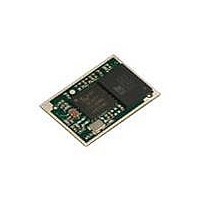DVK-BTM411 Laird Technologies, DVK-BTM411 Datasheet - Page 36

DVK-BTM411
Manufacturer Part Number
DVK-BTM411
Description
BLUETOOTH EVAL BOARD BTM411
Manufacturer
Laird Technologies
Type
Transceiverr
Specifications of DVK-BTM411
Frequency
2.4GHz
Wireless Frequency
2.402 GHz to 2.48 GHz
Interface Type
UART
Data Rate
2.1 Mbps
Operating Voltage
3 V to 3.3 V
Antenna
Multilayer Ceramic Integrated
Operating Temperature Range
- 30 C to + 70 C
Output Power
4 dBm
Technology/ Type
Development Kit
For Use With/related Products
BTM411
Lead Free Status / RoHS Status
Lead free / RoHS Compliant
Lead Free Status / RoHS Status
Lead free / RoHS Compliant, Lead free / RoHS Compliant
Other names
DVK-BTM411
Available stocks
Company
Part Number
Manufacturer
Quantity
Price
Company:
Part Number:
DVK-BTM411-02
Manufacturer:
LAIRD
Quantity:
2
BTM410/411
Bluetooth
AT COMMAND SET
REFERENCE
36 www.lairdtech.com
®
AT Data Module
Miscellaneous
Task
Initiate SCO link
Initiate eSCO link
Release SCO/eSCO link
Initiate SCO/eSCO link
Enable either SCO or
eSCO for incoming re-
quests and for AT+BTA8
Initiate SCO/eSCO link
automatically on each
SPP link
1. SCO / eSCO Audio Link
BTM modules provide an AT command to establish an SCO / eSCO audio connection between a pair
of BTM modules (or BISM2). This enables the user to create bidirectional audio links independently
from a particular Bluetooth profile. The only prerequisite is the existence of a Rfcomm link (serial port
profile) between the modules. If this link doesn’t exist, it can be created using AT+SPD<BdAddr>.
Please refer to pg. 29.
A SCO/eSCO link is intended for bidirectional transmission of speech. The sampling rate is fixed to
8 kHz, meaning a usable bandwidth of 3.5 kHz.
For SCO there are 3 packet types defined in the Bluetooth specification [1]: HV1, HV2, HV3. Each of
them occupies one slot. They differ in the level of bit error checking. It is recommended to enable all
three packet types for SCO links. This will pass the final decision down to the baseband. There is no
retransmission of erroneous SCO packets.
For eSCO and basic data rate, there are 3 packet types defined in the Bluetooth specification [1]: EV3,
EV4, EV5. EV3 occupies one slot, EV4 and EV5 can occupy up to three slots each. They differ in the
level of bit error checking. It is recommended to enable all three packet types for eSCO links. This will
pass the final decision down to the baseband. eSCO packets involve a CRC code and retransmission of
erroneous eSCO packets.
Packet types and link types (SCO or eSCO) are negotiated on link setup. A BTM can accept either
incoming SCO or eSCO links (S register 584), but not both SCO and eSCO at one time. If the
initiating side requests an unsupported link type, the audio link will fail. The initiating BTM module
is supposed to request the remaining link type in that case.
Table 3.14 lists all AT commands and S-Registers for SCO/eSCO links.
AT-Command/S-Register
AT+BTAx
AT+BTA100x
AT+BTA0 / AT+BTA
AT+BTA8
S584 [0..1]
S532 [0..7]
Table 3.14: SCO/eSCO AT-commands and S-Registers
Comment
x = packet type bitmask, recommended value = 7
1 = HV1
2 = HV2
4 = HV3
x = packet type bitmask, recommended value = 7
1 = EV3
2 = EV4
4 = EV5
Link type (SCO/eSCO) and packet types defined by
S584.
0 = SCO (HV1,HV2,HV3) enabled
1 = eSCO (EV3,EV4,EV5) enabled
Only one link type can be enabled at one time.
The recommended value to enable this feature is 7.
Value = bitmask for packet type. The link type (SCO/
eSCO) is defined by S584.
0 : Feature disabled
1 : HV1 (S584=0) or EV3 (S584=1)
2 : HV2 (S584=0) or EV4 (S584=1)
4 : HV3 (S584=0) or EV5 (S584=1)
Laird Technologies




















